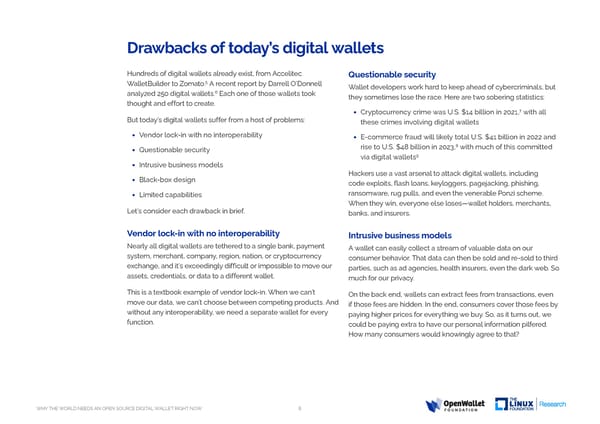Drawbacks of today’s digital wallets Hundreds of digital wallets already exist, from Accelitec Questionable security 5 WalletBuilder to Zomato. A recent report by Darrell O’Donnell Wallet developers work hard to keep ahead of cybercriminals, but 6 analyzed 250 digital wallets. Each one of those wallets took they sometimes lose the race. Here are two sobering statistics: thought and effort to create. 7 with all • Cryptocurrency crime was U.S. $14 billion in 2021, But today’s digital wallets suffer from a host of problems: these crimes involving digital wallets • Vendor lock-in with no interoperability • E-commerce fraud will likely total U.S. $41 billion in 2022 and 8 • Questionable security rise to U.S. $48 billion in 2023, with much of this committed via digital wallets9 • Intrusive business models • Black-box design Hackers use a vast arsenal to attack digital wallets, including code exploits, flash loans, keyloggers, pagejacking, phishing, • Limited capabilities ransomware, rug pulls, and even the venerable Ponzi scheme. When they win, everyone else loses—wallet holders, merchants, Let’s consider each drawback in brief. banks, and insurers. Vendor lock-in with no interoperability Intrusive business models Nearly all digital wallets are tethered to a single bank, payment A wallet can easily collect a stream of valuable data on our system, merchant, company, region, nation, or cryptocurrency consumer behavior. That data can then be sold and re-sold to third exchange, and it’s exceedingly difficult or impossible to move our parties, such as ad agencies, health insurers, even the dark web. So assets, credentials, or data to a different wallet. much for our privacy. This is a textbook example of vendor lock-in. When we can’t On the back end, wallets can extract fees from transactions, even move our data, we can’t choose between competing products. And if those fees are hidden. In the end, consumers cover those fees by without any interoperability, we need a separate wallet for every paying higher prices for everything we buy. So, as it turns out, we function. could be paying extra to have our personal information pilfered. How many consumers would knowingly agree to that? WHY THE WORLD NEEDS AN OPEN SOURCE DIGITAL WALLET RIGHT NOW 8
 Why the World Needs an Open Source Digital Wallet Right Now | The Linux Foundation Page 7 Page 9
Why the World Needs an Open Source Digital Wallet Right Now | The Linux Foundation Page 7 Page 9